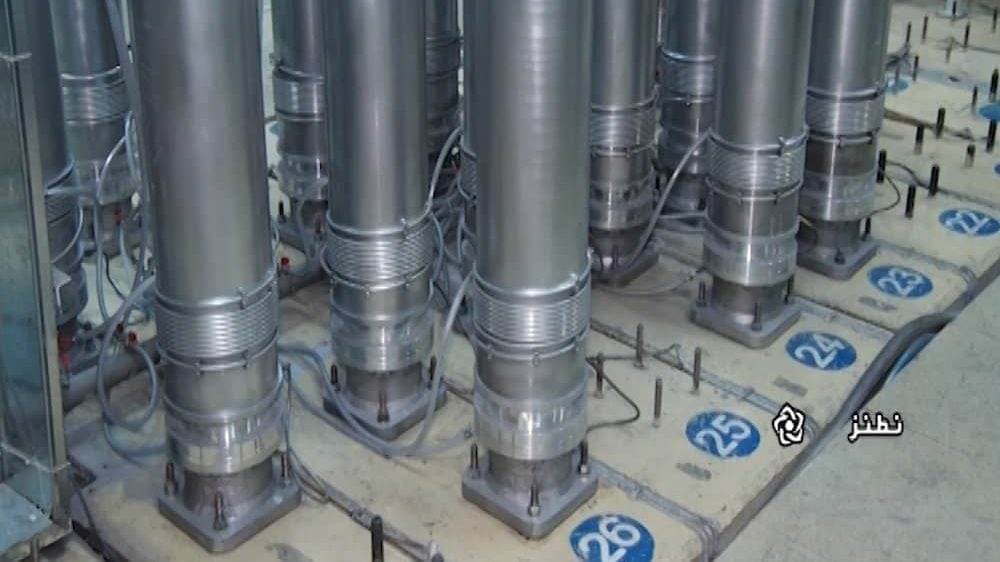Facebook
Twitter
LinkedIn
Pinterest
Reddit
Email
Print
 A cascade of centrifuges at the Natanz nuclear site in central Iran
A cascade of centrifuges at the Natanz nuclear site in central Iran
The international community has finally drawn a firm line in the sand regarding the Iranian regime’s nuclear ambitions. In a letter to the UN Security Council, the foreign ministers of France, Germany, and the United Kingdom (the E3) have formally declared their intent to trigger the “snapback” mechanism, a move that would reinstate all pre-2015 international sanctions against Tehran.
The ultimatum is clear: if the regime fails to reach a diplomatic solution and grant international inspectors full access to its nuclear sites by the end of August 2025, the crippling sanctions will automatically return. This has pushed the regime into a corner, prompting a contradictory response that reveals not strength, but profound fear and desperation.
#Iran’s Nuclear Program Can Be Rebuilt—Only Regime Change Can Guarantee Peace, Says Former #German Intelligence Officialhttps://t.co/zIitBVVSAH
— NCRI-FAC (@iran_policy) July 26, 2025
A Defiant Façade of Empty Threats
The regime’s initial public reaction was a familiar display of belligerence. On August 13, Manouchehr Mottaki, a parliamentarian and former foreign minister, threatened that Tehran would withdraw from the nuclear Non-Proliferation Treaty (NPT) if sanctions were reimposed. This threat was swiftly amplified by state-controlled media outlets like Mehr and Aftab News, which declared that the parliament was “ready to pull the trigger” on an NPT exit plan within 24 hours of a snapback.
This orchestrated defiance is a classic example of the regime’s brinkmanship, aimed at blackmailing the international community. Echoing this sentiment, the Foreign Ministry spokesperson insisted the E3 had no “legal or moral right” to trigger the mechanism and warned of vague “consequences” for both the non-proliferation treaty and the European nations themselves.
The Contradiction: A Scramble to Avert Disaster
However, beneath this thin veneer of defiance, the regime’s actions paint a starkly different picture—one of frantic diplomatic maneuvering to avoid the very consequences it claims to be unconcerned with. On August 3, Deputy Foreign Minister Kazem Gharibabadi revealed that the regime’s parliament and foreign ministry had held emergency meetings to discuss the snapback threat. Following this, he confirmed that a formal letter had been sent to the UN Secretary-General and Security Council members arguing that any snapback would be “illegal and unlawful.” This is not the action of a regime prepared to defiantly exit the NPT, but of one desperately seeking a legal off-ramp.
Tehran in turmoil as European deadline exposes deep divisions over nuclear program https://t.co/gWO9d42GEQ
— People’s Mojahedin Organization of Iran (PMOI/MEK) (@Mojahedineng) August 14, 2025
Furthermore, while publicly dismissing the E3, the regime is quietly keeping diplomatic channels open. The foreign ministry spokesperson confirmed an agreement to continue talks that began in Istanbul and stated that a delegation from the International Atomic Energy Agency (IAEA) is expected in Tehran “within less than ten days” for negotiations. Yet, in a move that exposes their duplicity, the head of the parliament’s security commission, Ebrahim Azizi, pre-emptively declared on August 5 that the IAEA delegation will be granted “no physical access” to nuclear facilities and will be “exclusively” permitted to hold “technical talks.” This is a transparent attempt to feign cooperation while denying the very access the international community demands.
A Crisis of Its Own Making
The Iranian regime is now ensnared in a trap of its own creation. Years of clandestine nuclear activities, enrichment far beyond civilian needs, and the systematic obstruction of IAEA inspectors have exhausted the world’s patience. The contradictory response to the E3’s ultimatum exposes not strength, but a deep-seated fear of international isolation and economic collapse.
This desperation is encapsulated in the hollow rhetoric of regime officials like Judiciary Chief Gholam-Hossein Mohseni-Eje’i. Speaking in Bojnourd on August 5, he channeled the Supreme Leader, declaring, “We accept neither an imposed war nor an imposed peace.” Such slogans are meaningless when the regime’s own policies have left it with no good options. The threats of NPT withdrawal are the last, desperate gasps of a cornered regime facing the inevitable consequences of its long history of deception and aggression.